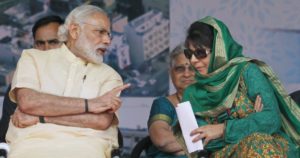Kashmir conundrum
Jammu and Kashmir plunged into political uncertainty with the Bharatiya Janata Party (BJP) pulling back its alliance with the People’s Democratic Party (PDP). The question is when will normalcy return to the state with uncertainty looming large?
Jammu and Kashmir constantly hits global headlines for the wrong reasons—militancy and terrorism. If nothing, political turmoil hits India’s border state at regular intervals. Early this week, the Bharatiya Janata Party ended its three-year alliance with the PDP government headed by chief minister Mehbooba Mufti, who responded by submitting her resignation to Governor N N Vohra.
Why did BJP withdraw from the alliance?
In the first place, it is not surprising that BJP withdrew its support to the PDP government.
The immediate reason was the killing of journalist Shujaat Bukhari, editor of ‘Rising Kashmir’ by militants a day before Id-ul-Fitr, on June 14.
Justifying the pulling out of the BJP, the party general secretary in-charge of Jammu and Kashmir, observed at a press conference, “Terrorism, violence and radicalisation have risen and fundamental rights of the citizens are in danger in the valley. Shujaat Bukhari’s killing is an example.”
Both the PDP and the BJP differed on the Centre’s decision to end its Ramzan ceasefire with terrorists. The month-long ceasefire in the valley witnessed a spurt in terror strikes in the region. Besides Bukhari, an army soldier by the name Aurangzeb was killed in a separate attack on the eve of Eid.
However, there was much difference between the two political parties since they came together to form the government. For instance, PDP wanted a softer approach towards stone-pelters and militants, despite rising violence.
It had promised talks with separatists. It also demanded the removal of the Armed Forces’ Special Powers Act (AFSPA) that gives sweeping powers to the army in insurgency-hit areas.
The rift between the parties further widened after the rape of an eight-year-old in Kathua. Two BJP lawmakers-Industries and Commerce Minister Chander Prakash Ganga and Forest Minister Lal Singh-even participated in a rally to demand justice for the arrested men, all Hindus. Later, they had submitted their resignations. The local BJP unit supported the men accused of kidnapping, gang-raping and killing the child belonging to a minority tribal community.
Why Governor’s rule?
As a result of political developments, the Centre imposed governor’s rule.
Interestingly, Vohra will preside over the Governor’s Rule for the fourth time. Previously, it was in 2008, 2015 and 2016. Governor Vohra will complete his tenure on June 25. However, a new governor is not expected before September.
The annual Amarnath Yatra is due to begin on June 28 and ends on August 26. So, Vohra is likely to continue till then.
Immediate impact
Directly under the Centre’s rule, security forces are preparing to resume counter-insurgency operations especially in the four districts of south Kashmir—Shopian, Kulgam, Anantnag and Pulwama. They have been the hotbed of militancy in the last two years.
Also, pressure is likely to mount on some leaders of the Hurriyat Conference. The National Investigation Agency, the federal counter-terror outfit is likely to question separatist leaders in connection with a suspected terror funding case.
But the question is why did the ceasefire fail? This was because it was flawed on many counts. First, it was a unilateral ceasefire. Second, it allowed the terrorists and separatists to consolidate their position and stage attacks at their convenience.
Third, when former Prime Minister Atal Bihari Vajpayee announced the ceasefire in 2000, the separatist movement in Kashmir was controlled by the Pakistan Occupied Hizbul Mujahideen and the Hurriyat Conference, based in Kashmir.
However, today home-grown militants are far more radicalised who have taken to guns and stone-pelting.
Besides the above-mentioned India factors, there is an external angle to the Kashmir imbroglio. The General Election is scheduled to take place in Pakistan next month. Every political party in Pakistan is set to whip emotions in order to appeal to voters, even as the Indian security forces are all set to mount an offensive on separatists.
Kashmir has once again hit a state of turbulence!










